Does being 'TikTok famous' actually make you money?
- Published
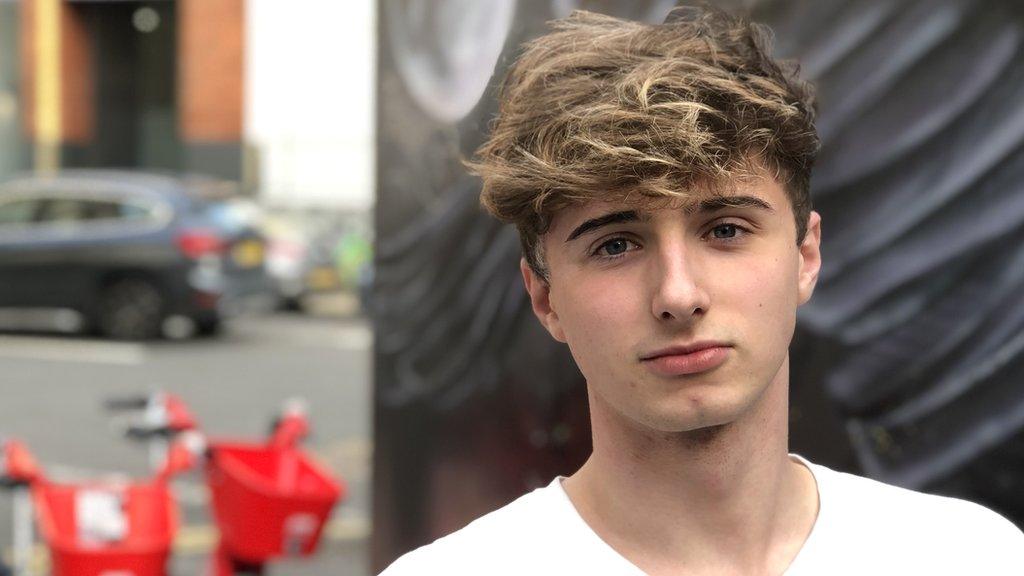
Jake Sweet, also known as the Tiktok star Surfaceldn
When I meet up with Jake Sweet (aka Surfaceldn, external on TikTok), he's buzzing.
He's about to be flown out to the MTV Video Music Awards in Spain as a special guest. Dinner will be laid on, he explains, and there will be aftershow parties where he will rub shoulders with music's biggest stars - but best of all, says the 21-year-old, he will hang out with other social media influencers he admires.
He got his invite because he has just over three million followers on the TikTok video sharing app (more than twice as many as pop star Dua Lipa). His presence at the event will boost its profile, as well as his own.
But once the party's over, it will be back to Earth with a bump. He will return to lectures at the University of Nottingham.
When not working towards his degree, Jake makes fun, craft-based videos on TikTok, with a sideline in pranking. For instance, he once surprised his brother by filling his duvet with popcorn.
But he's best known for customising trainers, and for his tricks with orbeez, colourful pellets that change size in water.
He started on TikTok just to have fun with his friends back in November 2018. His videos achieved tens of thousands of views almost immediately, so he threw himself into it.
Now meet Felicity Harfin (aka @refelicity, external) and her boys.
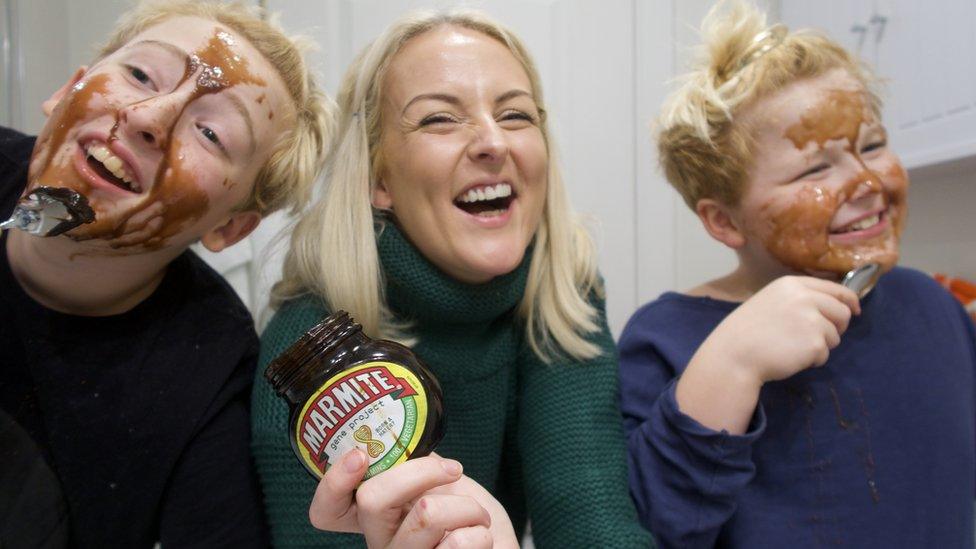
The Harfin family Tiktok stars
Felicity lives in Edinburgh and works in marketing - or at least she used to.
She discovered TikTok last year and decided to make some fun videos. Things really took off when she included her two sons.
Over summer she did a "prank-a-day" marathon called "Taking revenge on my kids". This included pretending to trap her hand in a car door and tricking them into smearing baked beans on their faces.
Half-way through the series, her videos were consistently getting two million views, and one achieved 13 million.
She now has 1.8 million followers and TikToking has practically become her full-time job.

TikTok is a Chinese-owned social media app that allows you to share short videos. The international version of the app has more than one billion users. In 2019 it was the second-most downloaded app globally, after WhatsApp.
The platform is owned by ByteDance and morphed out of the lip-syncing app Musical.ly. Music remains an important part of the experience - posts can be set to snippets of the latest commercial releases.
What sets TikTok apart from other social media platforms is the way it finds videos for you. As well as seeing videos posted by friends, users are recommended videos by the company's software algorithm.
Unlike Facebook, which recommends content based on your friends' activity, TikTok delves deep into users' behaviour on the app to figure out their tastes. Make the right kind of content and you can potentially reach millions of eyeballs.
And this explains a big reason for TikTok's appeal. In theory anyone can become "TikTok famous" - you don't have be a reality-TV star, or celebrity sportsperson to make viral videos.
Add to the equation the app's hashtag challenges and the experience becomes like a talent show.
On established platforms like YouTube and Instagram, influencers have made millions through advertising revenue and paid promotions. So can everyday influencers who crack the TikTok code make money, considering its vast reach?
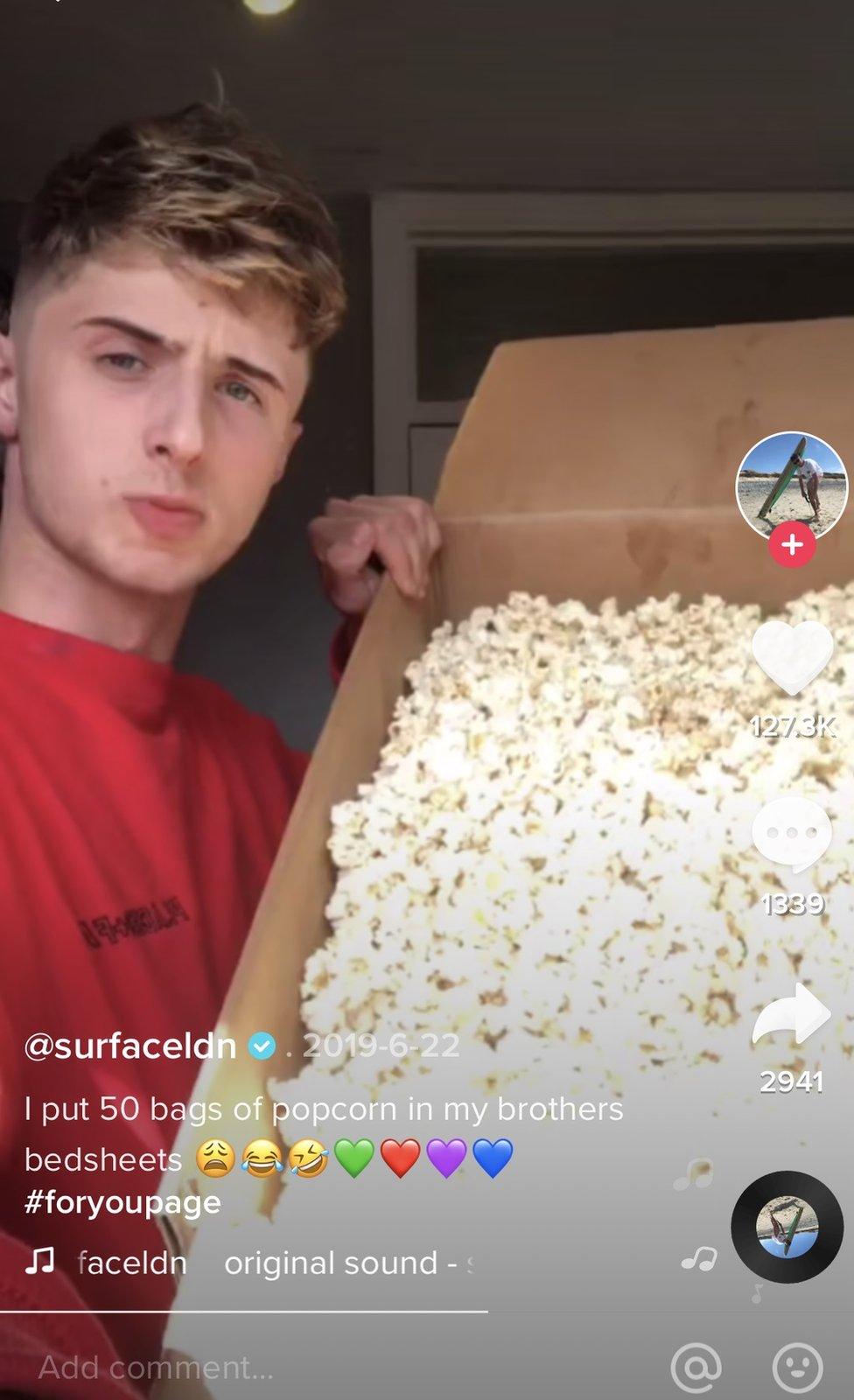
Jake filled his brother's duvet in one popular prank video

Jake earns a small but steady income from TikTok which helps him at university - it's enough for things like groceries. But most of the money he makes gets spent on props for his next videos, he says.
Doing several videos a day is time-consuming - even his 15-second videos can take up to an hour to record. He has to put in an "extra shift" to make sure his university studies don't suffer.
But he gets lifestyle perks like party invites, and the experience of being a social media celebrity.
"I do get some money through promotions," he explains. "I've done work with people like Amazon Music, rappers Trippie Redd and Juice Wrld."
"They say we need you to promote this song, by doing a video along these lines, and then I put my own creative interpretation into it."
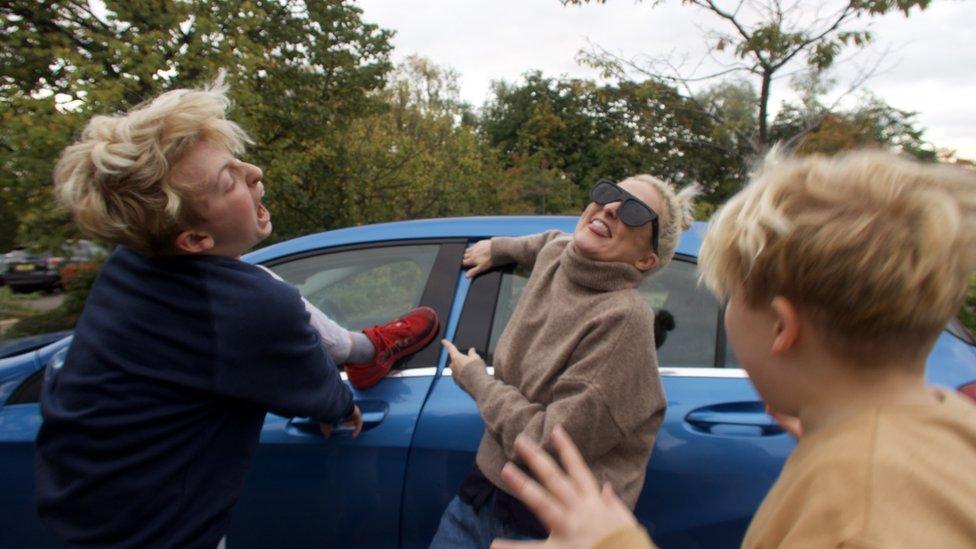
A memorable Harfin family video involved pretending to trap Felicity's hand in a car door
Jake gets his paid work through a company called Fanbytes, one of the digital agencies which have sprung up to service influencers.
Well-known early agencies of this kind include OP Talent, set up in 2012, which signed gaming star KSI, and Gleam Futures, which snapped up YouTuber Zoe Sugg.
Timothy Armoo founded Fanbytes in 2017 with fellow computer scientists he met at university.
Armoo explains how business mindset is built on maths - CEO Secrets, 2019
The company is busy signing up Snapchat and TikTok users, with a focus on "Gen Z" and the 18-21 market. It uses in-house algorithms to predict whose followings are about to take off.
Its software also measures who can persuade their followers to click on links - this is known as "conversion ability".
After that, some old-fashioned human decision making comes into play.
"We want people who can deliver what we call 'advertainment'", explains Armoo. This is a seamless mixture of fun and paid-for content, while maintaining what he describes as a "boy- or girl-next-door quality".
Armoo has hooked influencers up with brands like Deliveroo, but also the government, who wanted his help to spread the word about the national minimum wage to a BAME audience.

The UK's biggest TikTok stars
Holly H @hollyh, external - dance and lifestyle - 16.4m followers
Jamil and Jamel Neffati @neffatibrothers, external - dance and humour - 8.6m followers
Luca Gallone @lucagallone, external - magician - 7.3m followers
Abby Roberts @abbyrartistry, external - make-up artist - 6.6m followers
Bobbie @bobbie, external - lifestyle and humour - 5.8m followers
Source: TikTok

Influencers can generate an annual income close to £20-25,000 ($26-$32,000) if they build a following of more than two million on TikTok, Armoo reckons, from paid content, appearances and merchandising.

Now meet Shauni Kibby (aka @itzshauni, external).
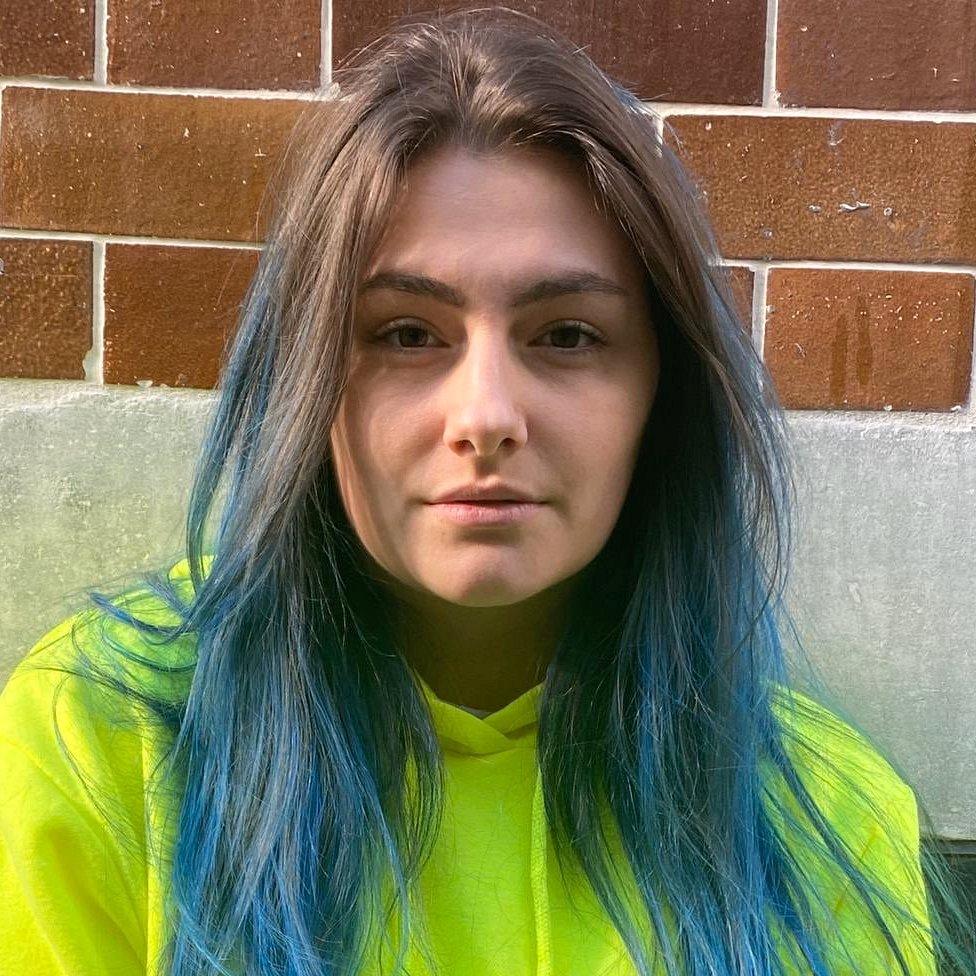
Shauni Kibby - known on Tiktok as @Itzshauni

Shauni gets recognised by young teenagers in the street all the time thanks to her work on TikTok, where she has 3.2 million followers.
She joined the app's predecessor, Musical.ly in 2016. Within five days her videos were getting 10,000 likes and she immediately saw the potential, she says.
You can see why her videos appeal to a young audience. Many are like playground games and include fun pranks, tricks to impress friends, dances, or skits about love and relationships.
TikTok now provides her with enough money to live on, plus the ability to indulge her habit of clothes shopping - but less than you might think, given the size of her fanbase.

Sara McCorquodale, who runs an influencer intelligence platform called CORQ which tracks TikTok trends, external, agrees the platform is a tricky financial proposition.
While she predicts that brands will be spending more money on it this year, the model for rewarding influencers will have to be different to YouTube or Instagram, because "short-term trends dominate what is popular as much as individual personalities".
"It's like the internet before Facebook, it's fast-moving and unpredictable."
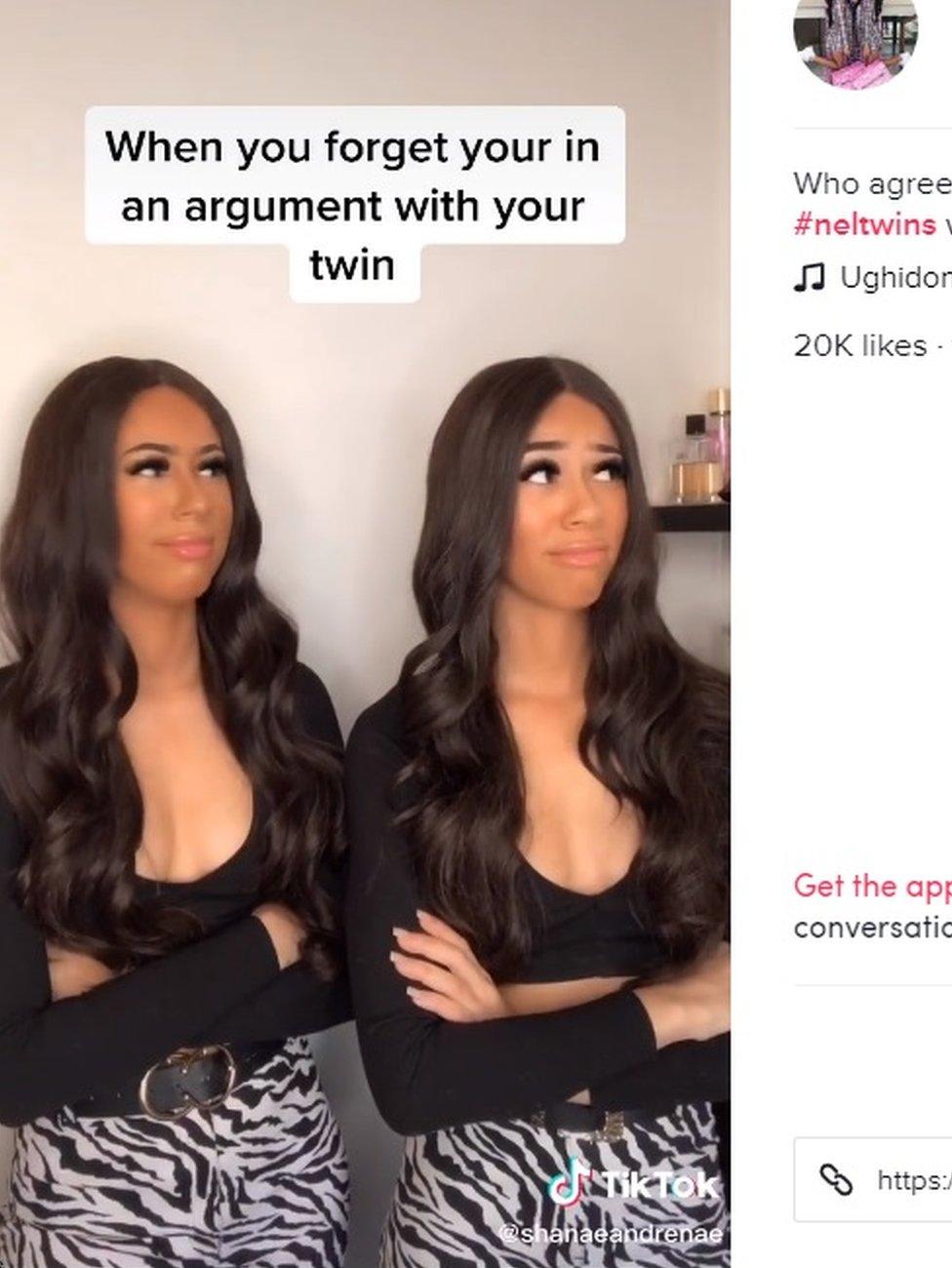
TikTok stars Shanae and Renae are launching a lip gloss product
TikTok is busy moving into the mainstream with an advertising campaign, and expanding its community management operation in London. It will have to manage its influencers' money-making activities more carefully as it gets more attention.
"If you make sponsored content you have to do it explicitly and if the brand or influencer doesn't, they can get sanctioned by the Advertising Standards Authority (ASA)," says Ms McCorquodale. "Even if you are wearing a piece of clothing that is a gift, that has to be made clear."
Not all influencers on TikTok are following these rules at the moment, and Instagram influencers have recently been banned for being irresponsible and for not being up front about product promotion.
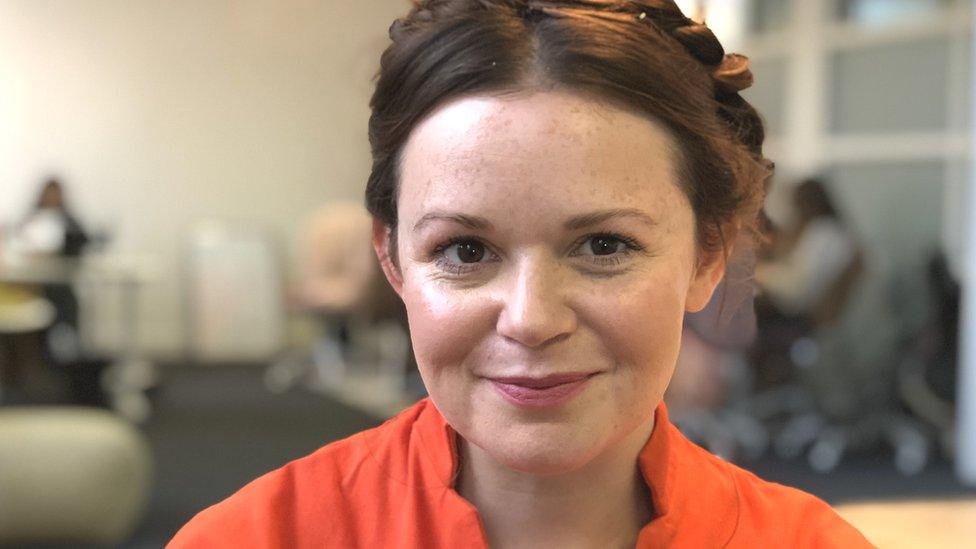
Sara McCorquodale runs a social media influencer intelligence agency
TikTok says that "every video posted as an advertisement is reviewed by us to ensure it is compliant with the ASA guidelines".
It also says it regularly shares the ASA guidelines with creators, and that if an influencer indicates a video is sponsored, it will automatically be posted with "#ad" displayed.
TikTok has fallen foul of influencer behaviour before. Last year it was forced to apologise for the way some stars exploited young fans for financial gain through "digital gifts", with influencers themselves calling for more guidance from the app.
TikTok's growing prominence has also seen it face closer scrutiny over issues that affect all social media platforms like user privacy and personal safety.
It was fined in the United States for holding data on children under 13 and more recently faced criticism for the meme known as the skull-breaker challenge.
Charities have also called for it to do more to prevent the grooming of young children, external.

Jake plans to complete his degree and then pursue a full-time career as a social media influencer, focusing on TikTok.
"I want this to be an occupation for me," he says. Meanwhile, he is simply enjoying the interesting opportunities it brings.
The student's next engagement is a party to celebrate the launch of a new shoe, which he will of course be TikToking about.
Follow Dougal on Twitter: @dougalshawbbc, external